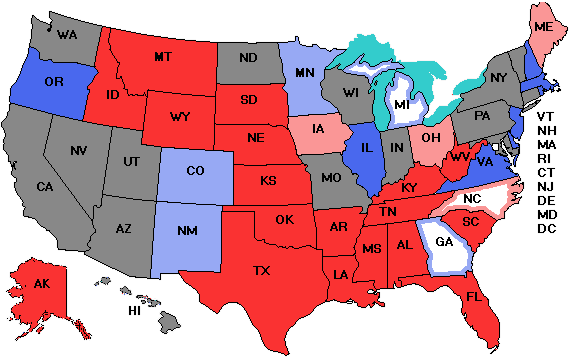• Trump Is Insatiable
• Tim Scott Watches Silently as Trump Destroys His Entire Legacy
• Judge Orders Trump to Restore the Voice of America
• Two New Polls Look Grim for Trump
• The Media Win a Couple of Legal Battles
• Dick Durbin Will Retire
• Maybe We Need Age Limits, Not Term Limits
• People Are Trying to Escape from a Collapsing House
• Q1 Fundraising Reports Are in
• Pick a Pope and Make Money
Republicans Are Contemplating the Unthinkable: Taxing the Rich
Putting together a budget has a lot of moving parts. Many of Donald Trump's plans will cost the government a lot of money—for example, not taxing tips. Also getting the Republican representatives from California and New York on board will require raising the SALT cap, which is expensive. Just running a bigger deficit will drive the Freedom Caucus up the wall. Most potential budget cuts are going to anger at least some representatives. Putting together a bill and getting it through a 220R-213D House will be tough. As a consequence, some people in Trump's inner circle are contemplating the uncontemplatable: raising taxes on rich people.
In particular, J.D. Vance and OMB Director Russell Vought seem open to the idea. Of course, the donors who fund the Republican Party aren't going to be keen on it, but something has to give for Trump to get his bill through. Steve Bannon is quite enthusiastic about taxing the rich, as a way to defang the Democrats' expected "Eat the rich" 2026 election theme. That has already started, actually. The tour Sen. Bernie Sanders (I-VT) and Rep. Alexandria Ocasio-Cortez (D-NY) are doing has as its theme "Fight Oligarchy":
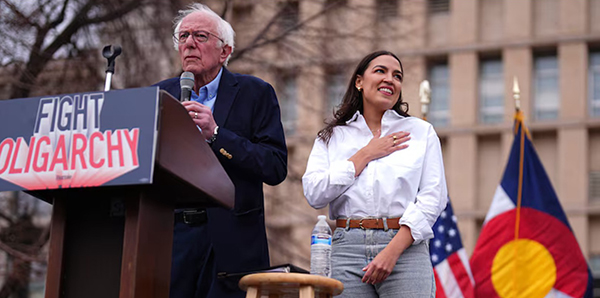
They are drawing crowds of tens of thousands of people all over the country. Other Democrats are surely going to notice this is a winning issue. By increasing taxes on rich people, Republicans could claim this issue as their own. Still, it will be a tough climb to get this past a narrowly divided House. (V)
Trump Is Insatiable
Thomas Edsall wrote an interesting column yesterday. It emphasizes Donald Trump's approach to squashing the media, the law firms, the universities, and every other possible source of opposition. It even works for tariffs. It is always the same playbook.
He picks one media outlet, one law firm, one tech company, one university, or one country to start with, and makes difficult, but not totally impossible, demands, with a severe penalty if they don't comply. It is a divide and conquer strategy. Most of the targets fold immediately. Then he uses this as a model for attacking others in the same sector. A few sue and he then tries his best to delay the cases basically forever. Interestingly enough, most of the deals are not written down, so the details may be understood differently by Trump and the target. What they need to do is not let themselves be divided, band together in a united front, pool resources, and sue, but they don't seem to understand this.
Later, Trump comes back with additional—and, in some cases, more onerous—demands. For example, he could make the law firms draft coal leases that avoid environmental regulations, write watertight university regulations that ban Palestinian speakers on campus, or negotiate international trade deals he wants. Since nothing is on paper, Trump could claim these things were included in v1.0 of the deal. Now the target is in a real bind. What the targets don't seem to realize is that Trump is insatiable and the real goal is to either completely subjugate them or destroy them. In many cases, he wouldn't mind the latter, to teach all the others a lesson.
Their assumption is that giving in once would save them. Historical parallels show that this doesn't work. Prof. Iveta Silova of Arizona State University wrote an essay entitled: "Universities in Nazi Germany and the Soviet Union thought giving in to government demands would save their independence." The essay shows that no matter how much German universities in the 1930s agreed with Hitler, gave him honorary doctorates, and restructured entire departments to please him, he just came back for more. Within a few years, none of them served knowledge; they served him.
Edsall asked a group of scholars how well Trump's targets were standing up to him. There was unanimous agreement that both chambers of Congress surrendered all their power without a whimper. Some media have almost completely capitulated in an attempt to save their business interests. Most big law firms, which are ideally suited to fight Trump in court, just gave up on first contact because none of the partners were willing to give up even a small part of their income to defend the rule of law. Even the billionaire class surrendered without a peep, despite being able to withstand almost any attack on their wealth.
A democracy requires that citizens understand the truth and their rights. That is why Trump is especially attacking institutions that deal in truth and rights—media, universities, and law firms. If they can be silenced, citizens can be kept ignorant and easily deceived.
Jack Balkin, a professor of constitutional law at Yale, has argued that the damage is even worse than it appears because even if Trump is stopped by the courts this time, everyone knows they can be bullied by the next administration, possibly in a different direction. And if not the next one, the one after it. He thinks putting back the old order where the media, universities, and law firms do their work without regard to what the current president wants will take decades to achieve, if ever. (V)
Tim Scott Watches Silently as Trump Destroys His Entire Legacy
As mentioned above, Congress has simply given up operating as an independent branch of government and sees its job as doing whatever Donald Trump orders it to do. This also applies to individual members, even senators. Sen. Tim Scott (R-SC) has worked tirelessly to support minority businesses. He helped expand and enhance the Minority Business Development Agency, which helps minority entrepreneurs grow their businesses, enter new markets, and access capital, while expanding government contracting opportunities. This is entirely consistent with the Republican way to help minorities: Don't give them free money; turn some of them into successful business owners who can create jobs for the others. He has put his heart and soul into this for years.
Now it is all gone. Trump decided this is waste and issued an XO that fired all but two of the MBDA employees (and the two survivors will be transferred elsewhere). All the grants to its 41 business centers will be immediately terminated. Nate Cavanaugh, a DOGEy, wrote: "Upon further review, MBDA has determined that your grant is unfortunately no longer consistent with the agency's priorities and no longer serves the interest of the United States and MBDA program." Trump has long opposed the MBDA.
MBDA is in the Commerce Dept. An anonymous Commerce employee said: "A lawful federal agency is being functionally eliminated through verbal instruction, without public transparency, process or regard for its statutory basis."
So what has Scott said or done about this situation? Nothing. No statements to the media, no interviews, zip. A former employee said: "They [Scott and other Republicans] are watching this happen, and they are doing nothing. That's cowardice. And it cuts especially deep when the people you once believed were our champions turn their backs in silence." Is anyone defending MBDA? Yes. Democrats, especially the ranking member of the House Financial Services Committee, Rep. Maxine Waters (D-CA). She said the dismantling "represents yet another unlawful and dangerous attempt to undermine a congressionally established institution vital to our nation's economy." But from Scott? Crickets. Your life's major achievement thrown out in a 1-page document signed by a petty tyrant and not a peep. (V)
Judge Orders Trump to Restore the Voice of America
Who says Donald Trump never shows loyalty to anyone? Kari Lake worships at his feet, so after she lost her Senate run in Arizona, he gave her a consolation prize: running the Voice of America, so she could sing his praises all over the world. Then, in typical Trumpian fashion, he stabbed her in the back by eliminating the Voice of America.
Several VOA workers sued. Since the VOA was created by law, only Congress can terminate it by repealing the law. Now U.S. District Judge Royce Lamberth in D.C., a Ronald Reagan appointee, has ordered the funding restored and the workers to return to their jobs. Among other things, Lamberth ruled that Trump acted "without regard to the harm inflicted on employees, contractors, journalists, and media consumers around the world. It is hard to fathom a more straightforward display of arbitrary and capricious actions than the Defendants' actions here." The term "arbitrary and capricious" has a very specific meaning in law and a finding that Trump's action met that standard will be important in the inevitable appeal.
The ruling was broader than only VOA. The U.S. government operates other stations as well, including Radio Free Europe and Radio Free Asia, which broadcast news and American culture in 48 languages around the world, along with American music. The focus is on countries where there is heavy government censorship of the news. It is incredibly stupid that Trump canceled them all, especially since Lake was fully prepared to praise Trump to the moon on VOA. What's the downside here? The VOA costs about $270 million/year, a drop in the federal bucket, so getting rid of it does next to nothing about reducing the deficit. (V)
Two New Polls Look Grim for Trump
The (unfortunate) reality is that many Americans don't care much about democracy, the Constitution or the rule of law, even though they say they do. But they care very much about the economy. If the economy is in the toilet in Nov. 2026, Republicans across the country will hear about it, in no uncertain terms. Although Donald Trump won't be on the ballot personally, his economy will be.
Consequently, it is important that a new Reuters/Ipsos poll shows that only 37% of Americans approve of Trump's handling of the economy. This is the low point of both Trump v1.0 and Trump v2.0. That is not an easy feat to pull off, since presidents generally don't have a lot of impact on the economy. However, Trump's tariffs certainly do, and people are noticing. In fact, 56% think Trump's retooling of the economy is "too erratic" and nearly 75% are worried about a recession.
Part of people's worries relate to the plunging stock market. A slight majority (52%) agreed with the statement: "Trump's actions could make it harder for me to live comfortably when I retire." A minority (31%) disagreed with the statement. Trump's overall approval rating has dropped to 42%.
Another bad marker is that three-quarters of Americans (including two-thirds of Republicans) don't like what the DOGEys are doing to Social Security. If the economy is in recession in 2026 and the Democrats talk a lot about it, they could do well.
The other poll with a warning is the Harvard Youth Poll, which shows that only 15% of U.S. residents 18-29 think the country is heading in the right direction. Fewer than one-third approve of Trump. Another point harks back to the Ipsos poll discussed above: More than 4 in 10 young Americans are barely getting by, and half of young adults without a college degree report financial hardship. For Black people, it is worse (45%). Latinos, it is even worse still (52%). Here are more detailed crosstabs:
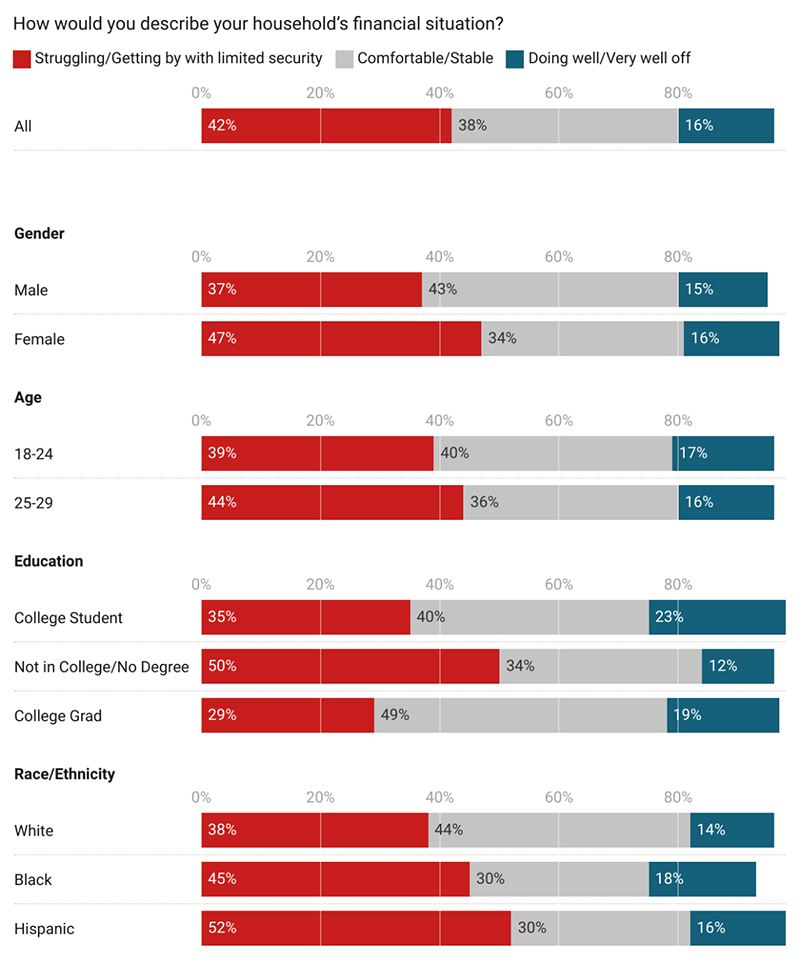
And most of them don't expect things to improve. Among those struggling or getting by with limited security, 51% believe that Trump's policies will make things worse and only 18% think they will help.
Another question was about goals. The top goals, in decreasing order of importance, are: be financially secure (86%), own a home (74%), find a long-term romantic partner (67%), get married (57%), accumulate significant wealth (56%), and have kids (48%). For each of the three financial goals, the estimate that they will ever achieve the goal is 20 points less than the importance. That is, young people want to be financially successful above all else and don't expect to achieve it. This never spells good luck for the party in power. There were many other questions asked of the young Americans as well, but the overall impression is that things are going badly.
This poll is possibly important because in 2024 a substantial number of Black and Latino men voted for Trump. Now they are experiencing the consequences of their votes. That could affect how they vote in 2026. (V)
The Media Win a Couple of Legal Battles
In March 2010, Sarah Palin ran this ad:

Many people interpreted the ad as an invitation to shoot the 20 representatives named in it, including then-Rep. Gabrielle Giffords. Palin denied that and said the crosshairs were something a surveyor might use. Maybe she was interested in how many acres there are in each district.
On Jan. 8. 2011, Jared Lee Loughner shot Giffords in the head in a Safeway parking lot just north of Tucson. She survived, but was badly injured. In Nov. 2012, Loughner was convicted and sentenced to life in prison. In 2017, in the wake of the shooting of Rep. Steve Scalise (R-LA), who fortunately survived, The New York Times ran an editorial decrying gun violence. It also said that some of it was politically inspired, specifically citing the 2010 Palin ad. Palin didn't like that so much and the Times issued a correction within 24 hours saying that there was no proof Palin's ad led to Gifford's shooting.
Nevertheless, in June 2017, Palin sued the Times. In 2022, she lost, but the verdict was thrown out on appeal based on a technicality. Then she sued again. On Tuesday, a new jury also rejected her argument, again, after only 2 hours of deliberation. It rejected her claim of defamation. She might appeal again.
The case had become a bellwether for conservative groups that want to remove the media's shield against defamation lawsuits. The idea is if some media outlet writes that Donald Trump made a poor choice in picking a secretary of defense who repeatedly leaks war plans to people who do not have a security clearance, then Trump should be able to successfully sue the media outlet for defamation. Tuesday's decision shoots a hole in that plan.
The other case involves NPR. There, a conservative group alleged that NPR is controlled by the Democratic Party and clearly and unmistakably advocated for Kamala Harris in 2024. Nope. A bipartisan 4-0 decision from the Federal Election Commission went for NPR and said that NPR is a news organization and is thus exempt from election laws governing political committees.
This decision comes at a critical time for NPR. It gets some of its funding from the federal government and Trump has said it is broadcasting "radical, woke propaganda disguised as news." A loss for NPR here would have given Trump some justification for going after NPR's budget. He might still do it, but with this FEC ruling, the chance that NPR wins the resulting court case just went up. (V)
Dick Durbin Will Retire
Sen. Dick Durbin (D-IL), the #2 Democrat in the Senate, has been in Congress for 44 years. He is also 80 years old. He knows how things ended for Dianne Feinstein, Strom Thurmond and other elderly senators and wants to leave on his own terms. So yesterday, he announced that he will not run for a sixth term in 2026. If he ran, he would certainly win and be 88 at the end of the term. He said: "The decision of whether to run for re-election has not been easy. I truly love the job of being a United States Senator. But in my heart, I know it's time to pass the torch." He will fill out the rest of this term, though. He is the fourth Democrat to announce a retirement this year. The others are Gary Peters (MI), Jeanne Shaheen (NH), and Tina Smith (MN).
Illinois is a very blue state and whoever wins the Democratic primary is 99.9% certain to win the general election unless he is caught in bed with one or more live boys, dead girls, and a small herd of goats. Thus, this announcement will start a feeding frenzy among ambitious Illinois Democrats, of whom there are plenty.
At least three Illinois Democratic representatives are known to be very interested in a promotion, namely Raja Krishnamoorthi, Robin Kelly and Lauren Underwood. However, they may be in for a rude surprise. Billionaire Gov. J.B. Pritzker (D-IL) is a strong supporter of Lt. Gov. Julianna Stratton (D-IL). While Krishnamoorthi has $19 million in his campaign account, Pritzker could set up a super PAC for Stratton and easily triple or quadruple that. Pritzker understands that if his money gets her elected to the Senate, he will be seen as a major power broker in 2028 and beyond. Given that she already holds statewide office and will be able to outspend all the others combined, she has to be considered the favorite at this point. The one potential candidate who could upset the race is former Chicago Mayor Rahm Emanuel, who has just returned from a stint as ambassador to Japan. (V)
Maybe We Need Age Limits, Not Term Limits
Dick Durbin is leaving of his own free will, but many politicians have to be carried out of office in a wooden box. Political forecaster Nathan Gonzales has come out saying we don't need term limits, we need age limits. We have seen far too many politicians who stayed around way beyond their best-by date, most recently Joe Biden, whose decision to hang on in there until it was too late may end up doing grave harm to the country.
The first argument against age limits is that it is age discrimination and that is somehow illegal or unfair. Well, the Constitution already has age limits built in. You can't serve in the House unless you are at least 25 or in the Senate unless you are at least 30, and you can't be president until you hit 35. Why is it all right that the Constitution bars a 24-year-old from serving in the House but it is not all right that it bars an 84-year old? Of course, putting in age limits would require a constitutional amendment. But age limits really aren't partisan. It might actually pass. A recent poll showed that 82% of Republicans and 76% of Democrats support an age limit.
Also, on the subject of age limits, the 26th Amendment lowered the voting age to 18, so the Constitution already mentions age in several places.
Then there is the nasty matter of what the limit should be and whether it should be the same for the House, Senate, and presidency. 70? 75? 80? 85? What if in 100 years people are almost always healthy at 100 and many live to 200? A number picked now could be way off in 100 years. One way out is not to pick one, but to say Congress may set the lower and upper age ranges by law, allowing future flexibility. Older members might chafe at being turned out to pasture, so the Amendment could be worded to say that it does not apply to members currently in office. Also, to avoid someone being ejected from Congress or the White House mid-term in the middle of a birthday party, probably the Amendment should state something like "May not be sworn in above an age determined by Congress."
There are some international comparisons available. Senators in Canada have a mandatory retirement age of 75. There will soon be an election for pope and cardinals 80 and older don't get to vote. Tough luck.
The average age of CEOs in the S&P 1500 is 58. The median age for U.S. senators is 65, but there are 14 senators 75 and older. While Durbin is out, Sen. Jim Risch (R-ID) is 81 and running for reelection next year. There are 41 House members 75 or older, some of them much older, like Rep. Hal Rogers (R-KY) at 87 and Rep. Maxine Waters (D-CA) at 86.
Some people might argue that knowledge is important to make Congress function. Function? Did someone say Congress is functioning? Who? And more important, why? (V)
People Are Trying to Escape from a Collapsing House
Many current House members ran for election because they wanted to pass laws of one kind or another. To their consternation, the House is completely paralyzed and can do nothing. Many of them, especially those who don't need the $174,000 salary, feel they are wasting their time there. It is so bad that about 40 members are either running for higher office or are contemplating it. In the graphic below, the members in green are definitely running and the ones in beige are considering a run. The members whose box has a solid outline are considering multiple offices, depending on who else shows up.
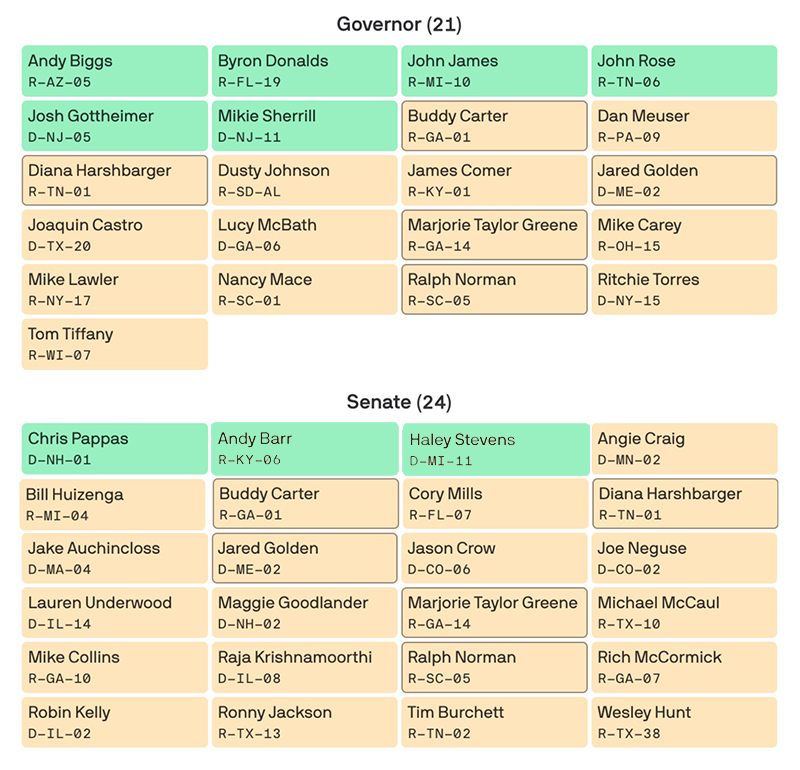
In some cases, a run for the Senate is more of a sign of personal ambition than a disgust with the House—because the Senate is just as deadlocked as the House and the pay is no better. A House member running for governor actually wants to get things done. (V)
Q1 Fundraising Reports Are in
Many members of Congress have released their Q1 fundraising numbers. These are usually members in tight races where they want to scare off the competition; however, senators who are not on the ballot in 2026 but who are very loudly anti-Trump are also raking it in. Some of them may spread the largesse around, rather than hoarding it.
For Senate races, Jon Ossoff (D-GA) pulled in an astonishing $11 million, far more than the $2.3 million Sen. Thom Tillis (R-NC) got. If Roy Cooper jumps in, then Tillis will need $100 million more. In Maine, Sen. Susan Collins (R-ME) raised only $842,000. She'll need at least 10x that amount. Sen. John Cornyn (R-TX) has a tough primary ahead, and his $1.6 million is but a drop in the bucket, especially if Donald Trump endorses Ken Paxton.
Over in the House, Republicans in swing districts averaged $977,000 compared to Democrats' average of $503,000. Democrats clearly have some work to do. Nine House Republicans raised over $1 million, compared to only three House Democrats. One of these Democrats is Rep. Haley Stevens (D-MI), who just announced her run for the Senate. She raised $1.2 million. Rep. Andy Barr (R-KY), who just announced a run for the seat of the retiring Sen. Mitch McConnell (R-KY), raised $1.9 million. In any event, the money race is definitely on. (V)
Pick a Pope and Make Money
We cover elections, even foreign ones sometimes, and soon a new pope will be elected, so let's go. There aren't any polls, since there are only 135 voters and it would be hard to get a statistically valid sample, assuming any of the 135 voters would be willing to talk, which is exceedingly unlikely. But there is another way to guess: the wisdom of crowds. Yup, there is a betting market where, if you are good at picking popes, you can make some money. Here are the probabilities on Polymarket derived from the bets already placed:
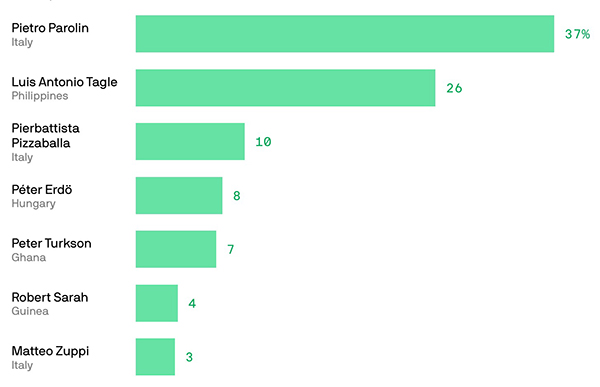
To the extent that the bettors know what they are doing, Pietro Parolin and Luis Tagle are the clear favorites. However, the volume of bets is only $3 million (compared to $55 million on the Canadian election). Of course people have known about the Canadian election for much longer than the papal election. It is unlikely that the late Pope Francis would have been amused by a betting market on his successor. He didn't think too much of the idea that the marketplace can solve all problems. However, there is no canon law forbidding betting on the next pope.
The last time around, the betting market didn't do so well. The favorites were Angelo Scola of Italy and Peter Turkson of Ghana. As it turned out, the #15 guy, Jorge Bergoglio of Argentina, won the gold medal. You are thus forewarned. (V)
If you wish to contact us, please use one of these addresses. For the first two, please include your initials and city.
- questions@electoral-vote.com For questions about politics, civics, history, etc. to be answered on a Saturday
- comments@electoral-vote.com For "letters to the editor" for possible publication on a Sunday
- corrections@electoral-vote.com To tell us about typos or factual errors we should fix
- items@electoral-vote.com For general suggestions, ideas, etc.
To download a poster about the site to hang up, please click here.
Email a link to a friend.
---The Votemaster and Zenger
Apr23 An Update on the Deportation Cases
Apr23 It's The Crimson vs. The Clown Show
Apr23 Ed Martin Is out of Control
Apr23 A Tale of Two Presidential Candidates
Apr22 A Re-Pete Offender
Apr22 Legal News: Time for a Trumper Tantrum
Apr22 Another Rough Day for the Markets
Apr22 The 7 Most Shameless Attention-Seekers in Congress
Apr22 Democratic Presidential Candidate of the Week, #37: Jon Tester
Apr21 Supreme Court Temporarily Halts Deportation of "Alien Enemies"
Apr21 Trump Fires His Third IRS Commissioner in under 100 Days
Apr21 Trump Is Starting to Implement Schedule F
Apr21 How the Grinch Stole Christmas: Tariffs
Apr21 Big Ten Schools Are Uniting
Apr21 Elections Matter
Apr21 Stefanik May Run for Governor of New York
Apr21 Barbara Lee Is Elected Mayor of Oakland
Apr21 Mark Carney Is Running for Prime Minister of Canada on an Anti-Trump Platform
Apr21 Pope Francis Has Died
Apr20 Sunday Mailbag
Apr19 Saturday Q&A
Apr19 Reader Question of the Week:
Apr18 The First 100 Days: Trump Off to a Rocky Start
Apr18 I Read the News Today, Oh Boy: On the Whole, I'd Rather Be in Philadelphia
Apr18 This Week in Schadenfreude: What a Jackass
Apr18 This Week in Freudenfreude: The Baseball Creed
Apr17 Federal Judge Has Found Probable Cause to Hold Officials in Criminal Contempt
Apr17 Chris Van Hollen Goes to El Salvador
Apr17 Trump Is Back for More
Apr17 Trump Orders IRS to Revoke Harvard's Tax-Exempt Status
Apr17 U.S. Attorney Pick Has Been on Russian Television 150 Times
Apr17 Judge in the Smallest State Makes a National Ruling
Apr17 Democrats Hammer Republicans for (Insider) Stock Trading
Apr17 America Has a Massive Trade Surplus--in Education
Apr17 Entire Defense Tech Unit Is Wiped Out
Apr17 Biden Finally Speaks Out
Apr17 Trade May Dominate the 2028 Republican Presidential Primaries
Apr17 Tom Friedman Is Very Worried about America
Apr16 Xinis Is Prepared for a Showdown with the Trump Administration
Apr16 Trump Has Yet Another Immigration Plan
Apr16 Election News: A Rough Year to Be an Incumbent?
Apr16 Polling News: A Republican, an Independent and a Democrat Walk into a Bar...
Apr16 Hands Off, Part V: White People Had a Great Protest
Apr16 All About the Benjamins, Part I: The Questions
Apr15 Fascism Watch, Part I: The War on the Citizenry
Apr15 Fascism Watch, Part II: The War on the Media
Apr15 Fascism Watch, Part III: The War on Universities
Apr15 Fascism Watch, Part IV: Generalissimo Donald Trump Is Still Alive
Apr15 Democratic Presidential Candidate of the Week, #38: Al Franken


